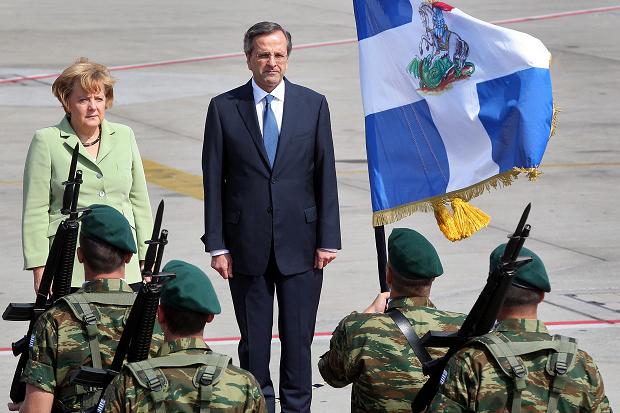Chancellor Angela Merkel has pledged Germany’s continuing support to Greece, during her first visit to Athens since the eurozone crisis erupted nearly three years ago.
Angela Merkel said Greece had made good progress in dealing with its vast debt but that it was on a “difficult path”.
Thousands of people who blame Germany for forcing painful austerity measures on Greece are protesting in Athens.
Police have used teargas and stun grenades against demonstrators.
Correspondents say this highly symbolic visit is a show of support for Greece’s continued membership of the eurozone.
It comes as Greece prepares to pass new cuts of 13 billion euros ($17 billion) to qualify for more bailout cash, a policy that has sparked growing unrest.
While Germany has contributed the most money to the bailout, its chancellor is held responsible by many for demanding that Greece make swingeing cuts in exchange for the financing it has received.
Angela Merkel was met by Greek Prime Minister Antonis Samaras on arrival in Athens.
At a news conference after talks with Antonis Samaras and business leaders, Angela Merkel said the pace of reform in Greece had recently “picked up considerably” and that the country had “a good bit of the path” behind it.
“Much has been achieved but much needs to be done and Germany and Greece will continue to co-operate very closely together in this respect,” she said.
Angela Merkel acknowledged that there were “many people suffering in Greece” as a result of the financial crisis and austerity measures, but that the difficult path was necessary to ensure future generations could live in prosperity
Antonis Samaras said their meeting had been “dominated by frankness, mutual understanding, solidarity, a spirit of collaboration and a feeling that we can overcome the Greek problem, and obviously, the European problems alike”.
He said Greece was “determined to fulfill its obligations and overcome this crisis” and was determined to stay in the eurozone.
“The Greek people are bleeding right now, but they are determined to win the battle of competitiveness.”
Angela Merkel’s visit was a “token of proof” of the progress Greece has made, he said.
Athens is said to be carrying out its biggest security operation in a decade, with some 7,000 police on duty.
Protests have been banned for the day in much of central Athens, and within a 100 m radius of the route Angela Merkel’s motorcade will travel.
However, outside the lockdown zone, thousands of people gathered, some carrying banners with slogans such as “No to the Fourth Reich”.
A three-hour strike was also called for the early afternoon.
The crowds have largely been peaceful, though some protesters threw bottles, masonry and rocks towards police lines.
The situation in central Syntagma Square turned nasty, with police firing teargas and stun grenades against grounds of protesters.
Dozens of people have been detained.
Christina Vassilopoulou, a 37-year-old teacher taking part in the unrest, said she objected to “the decisions taken at European meetings where Merkel manipulates the participants”.
“I have a doctorate and I make 900 euros a month, 400 less than before. We have children that go hungry and most of the parents are unemployed,” she told AFP news agency.
Vana Koronaiou, a shop owner selling German-made handbags near Syntagma Square, told AFP Angela Merkel’s visit “pours oil on the fire”.
“If she wanted to help, she should have done it sooner,” she said.
But some Athens citizens were upbeat about the visit.
Constantinos Siathas told Associated Press: “I think most people, at least those who think and don’t act based on feelings or utopian ideas, are pleased and are expecting a lot from Angela Merkel’s visit.”
Earlier, a spokesperson for the leftist Syriza party, Yiannis Bournos, said people were “frustrated and enraged because they clearly understand that Mrs. Merkel’s visit is just a theatre play for the political support of a collapsing coalition”.
The trip is a gamble, chaos on the streets would only underline for the German public that Greece is a lost cause.
But the visit – Angela Merkel’s first to Greece in five years – is sending a symbolic message that she wants Greece to stay in the eurozone.
Speaking on Monday, Jean-Claude Juncker, chairman of the Eurogroup finance ministers of the eurozone, raised the pressure on Greece, calling on the government to demonstrate it could implement planned reforms “by 18 October at the latest” to qualify for the next bailout installment of 31.5 billion euros.
He was speaking as the eurozone’s new permanent fund to bail out struggling economies and banks was formally launched at the finance ministers’ meeting.
Meanwhile, the International Monetary Fund said on Monday that the global economic recovery was weakening, with government policies having failed to restore confidence.
It added that the risk of further deterioration in the economic outlook was “considerable” and had increased.
[youtube JZ1UXSCqx4Y]
